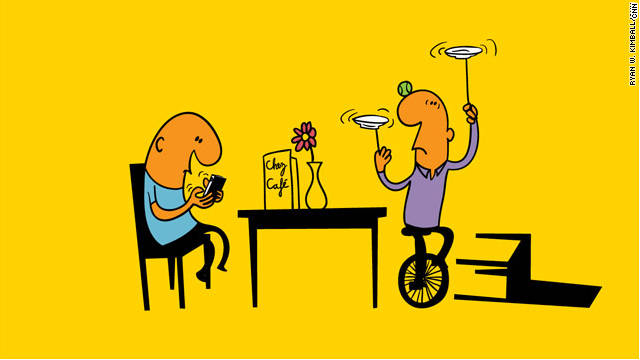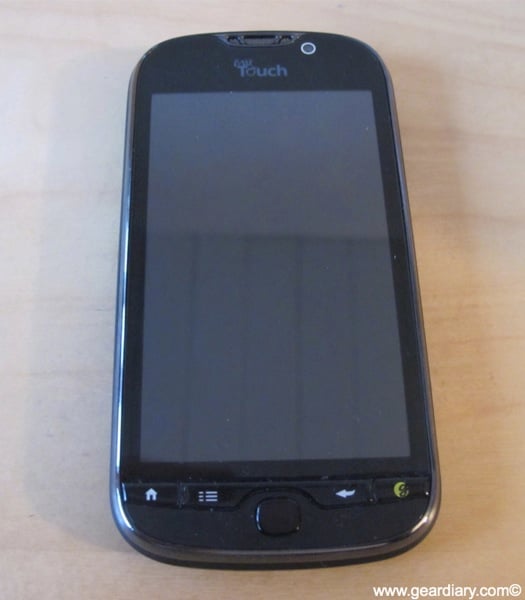By Doug Gross, CNNEditor's note: This is part of "Our Mobile Society," CNN's weeklong series examining how cell phones and other electronic devices have revolutionized the ways we work, play and communicate.
(CNN) -- It's a mobile society.
Call it good. Call it bad. It just is.
With an estimated 5 billion mobile phone connections in the world, not to mention the emerging number of tablet computers and other on-the-go connectivity gadgets, mobile technology has altered the way we live.
It's as hard to imagine spinning a rotary dial or fumbling for a quarter for the pay phone -- both staples of the generation before us -- as it is imagining what new mobile technology may exist in the generation to come.
But, for now, here's a look at 10 ways the omnipresence of mobile gadgets has already changed the way
Meeting up is easier
"We'll meet you there."
There was a time when those words would have required a bunch of follow-up details. That time is called "all of human history before everybody had a mobile phone."
Now, all we need to do is get our friends in, generally, the same geographical region. To finish the drill, dash off a quick "Where R U?" text. (Or, "Where are you?" if you're not into the whole brevity thing. Or if you like grammar).
Change the old adage. "Close" now counts in horseshoes, hand grenades and meeting each other when you have mobile phones.
There's no excuse to be bored
Standing in line? Killing those last five minutes before quitting time? Stuck in the doctor's waiting room or *shudder* the DMV?
There was a time in human existence when all of these occasions would have left us staring at the walls in a zombie-like stupor, particularly if there's not a magazine or book handy.
Now? Chat with a friend. Surf the Web. Check your stocks. Fling birds at pigs.
Smartphones, or tablet computers, put an amount of computing power in your pocket that would have taken up an entire room a generation ago. If you can't find something to entertain you for a few minutes of down time, you just haven't downloaded the right app.
(Editor's note: Notice we didn't say you could do any of this while stuck at a red light. Because we'd never endorse fiddling with your phone while driving. Nope. Never. Ahem.)
Fast-twitch brains
And here's the downside of that one.
Find yourself with a dead battery, malfunctioning phone or -- gasp -- a few minutes away from the thing, and watch what happens. Getting twitchy? Afraid that Words with Friends game has gotten out of control? What if you missed a text?
Or there are those moments when you really should be doing something else, but the buzz of the BlackBerry draws you to its screen again and again and again.
No less an authority than the New York Times posits that "computers and cellphones, and the constant stream of stimuli they offer, pose a profound new challenge to focusing and learning."
Gadgets help us do things fast. But sometimes, it's worth wondering whether their constant, glowing allure helps us do them well.
You're always around
Call this one a blessing and a curse.
There was a time when "Sorry, I popped out for a few minutes" would have worked as an excuse when you're boss called to ask you to go ahead and come in on Saturday. Now, even "I'm on vacation in Bulgaria," "I'm in the middle of L.A. rush-hour traffic" or "I'm currently on the operating table" might not work.
It's just expected that we all have a mobile phone on us at all times. Honestly, when's the last time you heard the phrase "I don't have a cell phone" from someone who lives in an industrialized nation?
The upside is some of the other stuff mentioned here. The downside is that, in a way, we never leave the office.
Horror movies had to add a line
There was a brief moment in the '90s, before Hollywood caught up with real-world consumer technology, when horror-movie audiences were getting their suspension of disbelief slashed to bits.
I mean, sure, we'll accept a kill-crazy animated children's doll or a horde of slavering, reanimated zombies. But how could a cabin full of randy co-eds or a baby-sitter left alone in a creepy house not have a cell phone to call for help?
Fear not. The writers and directors got more savvy, and soon, every single horror movie contained a pivotal "Why the Cell Phones Don't Work" scene.
Don't believe it? Watch this video for five straight minutes of soon-to-be-terrorized scream queens and kings bemoaning their lack of signal or otherwise losing, breaking or abandoning their life-saving phones.
We're particularly fond of "The Hills Have Eyes." "Nothing," our hero says. "Ninety-seven percent nationwide coverage, and we find ourselves in that 3%."
We bet some mobile customers in big, tech-centric cities can sympathize.
Smile! You're on camera!
In our mobile world, everybody's a one-man or one-woman reporting crew.
If you've got a mobile phone, you've probably got a camera on it. If you've got a smartphone, that most likely means camera, video and sound recording abilities.
All this means that, with no planning whatsoever, we're able to document our lives quickly and easily when the desire strikes.
This can lead to great stuff. Our own iReport thrives on it. And much has been made of the role participant videos and photos have played in circumventing crackdowns on traditional media in places like Iran and Egypt during recent political unrest.
It also means that, if you're planning on any sort of bad behavior in public, you'll be surrounded by digital shutterbugs more than happy to put it on YouTube for you.
Update anxiety
What? You've got an iPhone 3G? Luddite!
You like your Droid X? That's so July 2010. The guy in the next cubicle just walked in with the Droid Bionic.
The lightning-fast cycle of electronics updates these days can cause folks walking around with perfectly functional phones, tablets and the like to feel like low-tech outcasts.
We all know that the iPhone refreshes itself roughly once a year (the unveiling of the 4S being slightly behind schedule). So, for roughly half of your phone's life, you'll know the world is closer to seeing a newer, sleeker, shinier model than it is to the day your current phone seemed ... well ... new, sleek and shiny.
All-In-One
A phone. A map. A compass. A camera. A video recorder. A video-gaming device. A portable music player. A laptop. A GPS device. A flashlight.
There was a time in the not-so-distant past when, if you wanted to have all of those things, you had to carry all of those things.
And that's just the first 10 that came to mind.
Today's mobile devices keep you lighter on your feet, cramming them all into one device.
Conversation killer
She's chatting you up. You're checking your e-mail.
They're laughing at a hilarious joke. You're tweeting about your appetizer.
He's declaring his undying devotion. You're cutting the rope, blitzing jewels or angering birds.
Yes, our gadgets provide a world of possibilities. But if we're not careful, they can sometimes pull us away from the real one.
Conversation killer (Redux)
On the other hand, some conversations aren't necessarily awe-inspiring.
There's the guy on the airplane who wants to tell you all about affordable business-overhead expense-disability insurance. Or the one you barely knew, and didn't much like, in high school who, 20 years later, insists upon an awkward stop-and-chat.
Dive deep into the friendly confines of your mobile phone and you're safe.
It's essentially a ... wait. I'm sorry. I've got to take this.
source:
edition.cnn.com





















